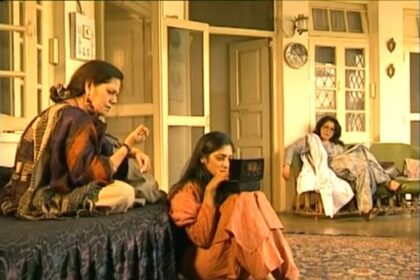Who Does the Dishes?
She posts a Women’s Day story with a quote by Audre Lorde.
Then she clears the table.
Her brother is still scrolling in the lounge.
No one expects him to rinse even his own glass.
This is where feminism in a desi household splits into two timelines: the digital one — loud, articulate, and curated for applause — and the domestic one — quiet, inherited, and unpaid.
And most of us are caught in between.
Where the Screen Ends, the Sink Begins
Feminism in South Asia has found sharp voices online. Students lead teach-ins, Instagram accounts post carousel infographics, and girls tweet searing takedowns of misogyny between university deadlines. It feels like something is shifting — like we’re speaking in a new language, one built on clarity and rage.
But what happens when the screen turns off?
Because even the most articulate feminist online often finds herself back in a kitchen, clearing plates while her brother relaxes. At home, the language of resistance doesn’t always translate. At home, many of us are still being raised as second mothers, expected to serve without asking, love without limits, and speak only when spoken to. The revolution may be virtual, but the chores remain painfully real. Repetitive. Expected. Gendered.
And this isn’t hypocrisy. It’s a contradiction. It’s survival. It’s what happens when your politics are radical, but your context is not.
With the rise of digital activism and women-led movements across South Asia — from Aurat March slogans to reels critiquing rishta culture — there’s a growing dissonance between what we post and what we live. This moment demands we bridge that gap.
The Weight of Peace: Why Feminist Daughters Stay Quiet
Desi feminism isn’t always a refusal. Sometimes, it’s a negotiation. You believe in liberation but also know what happens when you say no to your mother’s request to serve dinner. You know the tension it causes and the names you’re suddenly called: disrespectful, selfish, and rude.
A girl once told me:
You can’t dismantle patriarchy in a house where your grandmother is watching.
She was right.
Because the price of even a small rebellion, sitting down after dinner instead of cleaning up, can be emotional exile.
So you stand up. You do the dishes. You keep the peace.
And you try again tomorrow.
He Never Entered the Kitchen. She Never Left It.
I’d hear classmates joke about how their brothers didn’t even know where the sugar was kept.
I’d see girls juggling school and chores while their brothers got extra tuition, extra praise and extra rest.
At daawats, the girls — even the guests — were ushered into the kitchen to help, while the boys stayed reclined, clapped on the back for offering to carry one tray.
A cousin gets married, and the pressure begins. The bride is expected to make nine types of paratha and “adjust” with the in-laws. No one asks if the groom can even fry an egg.
Mothers say it casually, even proudly:
My son has never had to step into the kitchen. His sister takes care of everything.
It isn’t said with guilt. It’s said like a compliment.
One of my friends admitted:
I don’t think I’ve ever washed a dish at home. My mom just… always did it. I never asked her to. She just did. And I let her.
He looked surprised — like he was only realising it as he said it.
Another friend shrugged:
It’s not that deep. Women are just better at this stuff. Nurturing. It’s natural.
This is how the patriarchy sustains itself: not just through force, but through comfort.
Through the unexamined luxury of being cared for without question.
The kitchen door never opened for them — so they never knew what it cost to keep it running.
The Soft Shape of Resistance
We often mistake feminism for spectacle. But what if it looks less like protest and more like preparation? Like a girl applying for a scholarship in secret. Or like her whispering to her friend, “Don’t give up your dreams just because he asked you to.” Or like her slowly saving enough money to leave a house where she’s expected to be grateful just for being allowed to exist.
This too is feminism.
Feminism that folds laundry. Feminism that stays quiet until it’s safe to speak. Feminism that survives.
But we must ask: why must our resistance always be polite? Why must daughters carry the burden of protecting family honour and fighting systemic inequality? Why are we asked to be strong but never disruptive?
Feminism Is Not an Aesthetic
There’s a performance to some forms of online feminism — especially among girls who grew up with domestic workers, who post feminist slogans while someone else washes their dishes and irons their clothes.
It’s easy to critique patriarchy in theory while remaining complicit in the systems that benefit you.
Feminism is not a vibe. It’s not a tote bag. It’s not an aesthetic — it’s a responsibility.
It’s not about trendy slogans or Instagram posts with perfect lighting. It’s about the messy, everyday work of confronting inequality — in our homes, in our relationships and in the systems that surround us.
It’s how you treat the people who keep your world running — whether that’s the maid, the mother, or the sister who picks up the slack.
It’s uncomfortable, it’s demanding, and it doesn’t always look glamorous. Because true feminism asks us to look beyond appearances — to challenge our own complicity and to redistribute power and care.
If your feminism makes space for rage against men but none for reflection on class or caste — it’s incomplete.
It’s how you treat the woman who cleans your house.
It’s whether your brother picks up his own plate.
It’s how invisible labour is named, acknowledged and redistributed.
The Cost of Silence: What This Is Doing to Us
This imbalance isn’t just unfair — it’s harmful.
Girls are growing up learning to ignore their own exhaustion.
Mothers are burning out in kitchens, still being called selfish if they rest.
Daughters are shamed for dreaming, while sons are praised for existing.
Unseen labour leads to unseen pain:
Resentment buried beneath duty.
Talents delayed, sometimes forever.
Relationships that feel one-sided — because they are.
This isn’t just about who clears the table. It’s about what we lose when care is never returned and rest is never allowed.
And when a girl finally breaks — when she says no — she’s told she’s changed. But the truth is she’s tired.
The Dinner Table is a Battleground
If feminism in Pakistan is to mean anything, it must begin at the dinner table.
Who eats first? Who eats last? Who clears the table while the men talk politics?
The patriarchy doesn’t only exist in boardrooms or courts. It lives in bedrooms, kitchens, WhatsApp family groups, dowry lists, wedding guest expectations and whether a woman can rest without being called lazy.
Desi feminism has to move past performance.
It must be practised — in how we teach boys to care, how we protect girls who say no and how we stop mistaking servitude for softness.
Feminism Isn’t the Absence of Care — It’s the Redistribution of It
The problem isn’t that we cook, clean and care.
The problem is that it’s expected of us. That it is thankless. That it is assumed.
Our tired backs are framed as love. Our sacrifice is dressed up as tradition.
We are taught to pour and pour and pour, and even when we are empty, someone still asks for more.
Sara Ahmed writes,
When you expose a problem, you pose a problem.
And we are exposing it now — clearly, unapologetically.
So, Who Washes the Dishes After Dinner?
Maybe, for now, it’s still us.
But feminism means we start asking why.
And more importantly — that others start asking too.
It means reminding your brother that his hands work.
It means reminding yourself that love is not proved through exhaustion.
It means recognising that tweeting about equality is easy — practising it at home is not.
Because desi feminism cannot stop at aesthetics or slogans.
It must travel beyond the screen — into kitchens, dining rooms, and family WhatsApp groups.
Into the pauses before a mother asks you to serve tea. Into the decision to say yes — or not.
This feminism is not loud. It doesn’t trend.
But it’s happening quietly — in the redistribution of care, in the conversations we now dare to have, and in the small refusals that feel like rebellion.
Maybe we still do the dishes.
But now, we look around.
We ask, Why me?
We ask, why not him?
And we keep asking — until the silence breaks.
Because real feminism begins not when the tweet goes viral but when the dish is washed by the one who never even noticed it before.
















